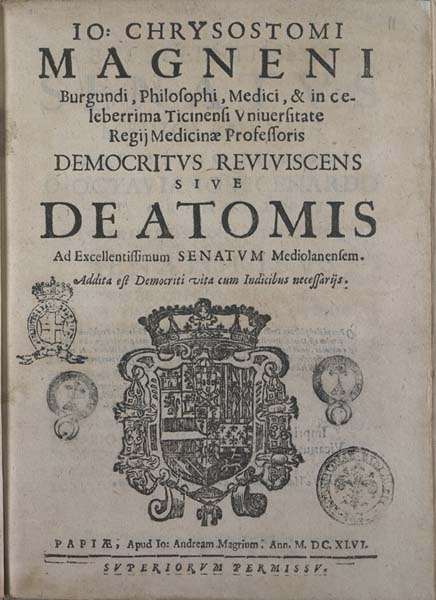Johann Chrysostom Magnenus on:
[Wikipedia]
[Google]
[Amazon]
Johann Chrysostom Magnenus (French ''Jean Chrysostôme Magnen'', c. 1590 – c. 1679) was a physician and advocate of  He joined the medical faculty at the
He joined the medical faculty at the
WorldCat pageCERL pageOnline Books page
{{DEFAULTSORT:Magnenus, Johann Chrysostom University of Pavia faculty 17th-century French physicians Natural philosophers
atomism
Atomism (from Greek , ''atomon'', i.e. "uncuttable, indivisible") is a natural philosophy proposing that the physical universe is composed of fundamental indivisible components known as atoms.
References to the concept of atomism and its atoms ...
.
He was born at Luxeuil
Luxeuil-les-Bains () is a commune in the Haute-Saône department in the region of Bourgogne-Franche-Comté in eastern France.
History
Luxeuil (sometimes rendered Luxeu in older texts) was the Roman Luxovium and contained many fine buildings at ...
in Burgundy
Burgundy (; french: link=no, Bourgogne ) is a historical territory and former administrative region and province of east-central France. The province was once home to the Dukes of Burgundy from the early 11th until the late 15th century. The c ...
. He took a medical degree at the University of Dôle
The University of Dole was founded in 1423 by Philip the Good of Burgundy at Dole in the Free County of Burgundy (then a principality of the Holy Roman Empire, but now in France). It became a leading university in western Europe, historically nota ...
.
 He joined the medical faculty at the
He joined the medical faculty at the University of Pavia
The University of Pavia ( it, Università degli Studi di Pavia, UNIPV or ''Università di Pavia''; la, Alma Ticinensis Universitas) is a university located in Pavia, Lombardy, Italy. There was evidence of teaching as early as 1361, making it one ...
, where he published his scientific work ''Democritus reviviscens'' in 1646.
He cited Daniel Sennert
Daniel Sennert (25 November 1572 – 21 July 1637) was a renowned German physician and a prolific academic writer, especially in the field of alchemy or chemistry. He held the position of professor of medicine at the University of Wittenberg for ma ...
, but his ideas were distinct from Sennert's and those of Democritus. He considered that atoms were the indivisible parts of three of the classical elements
Classical elements typically refer to earth, water, air, fire, and (later) aether which were proposed to explain the nature and complexity of all matter in terms of simpler substances. Ancient cultures in Greece, Tibet, and India had simil ...
: earth, water and fire.
In 1646, Magnenus estimated the number of atoms contained in a piece of incense
Incense is aromatic biotic material that releases fragrant smoke when burnt. The term is used for either the material or the aroma. Incense is used for aesthetic reasons, religious worship, aromatherapy, meditation, and ceremony. It may also be ...
from an argument based on the sense of smell (if a fraction of the grain is burned, the number of particles can be estimated from the volume within which the scent is still perceptible).
His estimate for the number of particles in a piece of incense "not larger than a pea" was of the order of 1018.
This estimate is remarkably accurate, within about three orders of magnitude of the true value (based on the number of molecules in the unburned incense) and thus only one order of magnitude off in linear dimension of the molecule. Magnenus was by far the earliest scholar to give a reasonable estimate for the size of a molecule; the first "modern" estimate was given more than 200 years later, in 1865, by Josef Loschmidt.Loschmidt, J. (1865). "Zur Grösse der Luftmoleküle". ''Sitzungsberichte der Kaiserlichen Akademie der Wissenschaften Wien''. 52 (2): 395–413.
His other writings include ''De tabaco'' (1648), on the medical usage and effects of tobacco
Tobacco is the common name of several plants in the genus '' Nicotiana'' of the family Solanaceae, and the general term for any product prepared from the cured leaves of these plants. More than 70 species of tobacco are known, but the ...
, and ''De manna liber singularis'' (1648). He apparently prescribed tobacco syrup as a standard remedy for his patients.
References
*J. Güsgens, ''Die Naturphilosophie des Johannes Chryostomos Magnenus'', Bonn, 1910.External links
WorldCat page
{{DEFAULTSORT:Magnenus, Johann Chrysostom University of Pavia faculty 17th-century French physicians Natural philosophers